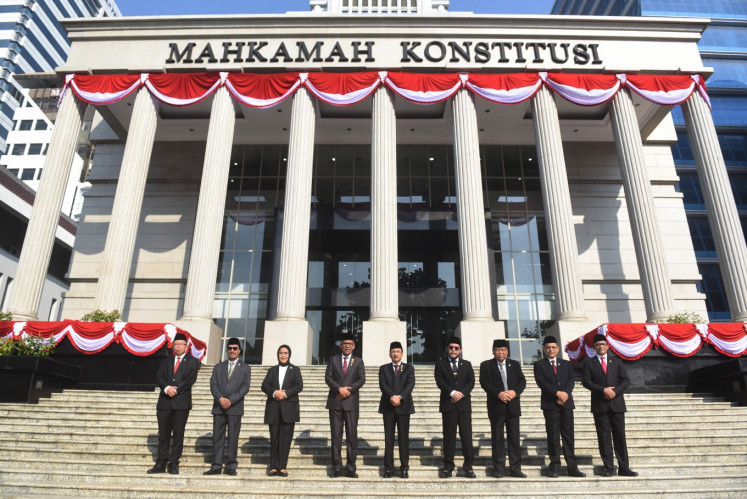Popular Reads
Top Results
Can't find what you're looking for?
View all search resultsPopular Reads
Top Results
Can't find what you're looking for?
View all search resultsHomegrown social-service apps, startup success
Slipicon dreaming: Employees work at KejoraHQ in Slipi, West Jakarta, on Wednesday (Aug
Change text size
Gift Premium Articles
to Anyone
 Slipicon dreaming: Employees work at KejoraHQ in Slipi, West Jakarta, on Wednesday. Companies at the headquarters wish to make the so-called Slipicon Valley a startup hub in Greater Jakarta.(JP/Jerry Adiguna) (JP/Jerry Adiguna)
Slipicon dreaming: Employees work at KejoraHQ in Slipi, West Jakarta, on Wednesday. Companies at the headquarters wish to make the so-called Slipicon Valley a startup hub in Greater Jakarta.(JP/Jerry Adiguna) (JP/Jerry Adiguna)
S
span class="caption">Slipicon dreaming: Employees work at KejoraHQ in Slipi, West Jakarta, on Wednesday (Aug. 19). Companies at the headquarters wish to make the so-called Slipicon Valley a startup hub in Greater Jakarta.(JP/Jerry Adiguna)
If you are a Jakarta-based expat looking for a way to survive the city's crowded public transportation networks, an android-based application will help you. Perhaps you are a mother who needs to see that your children are complying with their school program? Don't worry, there's an application available for you too.
In the digital era, one can simply transform a cheap Rp 1 million (US$ 70) gadget into a magical box filled with applications (apps), technical tips and information tailed to help guide you through your day.
For Indonesia, a country with a population of more than 250 million people, an archipelago where it is predicted that each person is in possession of more than one gadget each'on average, the app business has become a big blue ocean of opportunity for startup warriors.
From successful business-oriented startups such as Go-jek and Traveloka, to new comers such as Bulletinboard, Qlue and Apaja; apps have been the elusive pearl discovered in the ocean of Indonesia's business potential.
What these apps have in common is that they aim to save time. In today's age of the instant, people thirst for efficiency in everything'in every aspect of life'even when, merely a few years ago, we had not noticed that there was such a gaping need.
Let's look at Go-jek for example. We live in an era where it is possible to find ojek (motorbike taxi) on almost every corner of Jakarta's streets. Five years ago, honestly, did you think that you would require an app providing you with handy access to ojek?
Startup developers begin with this kind of idea; an idea that the general public may not have considered. Unlike ordinary people, who usually only see what people need in the moment, startup developers have an ability to see what kind of apps are required to help ease the day-to-day stress in people's lives, now and into the future. They develop apps that will become so handy that people cannot, or do not want to, live without them.
Now a new app-based trend has appeared. Not only are app developers creating commercial-oriented apps, developers have begun to create apps that provide social-type services. For some of us, it may be hard to comprehend the business-prospects of social-type app development, but this is not an issue, it would seem, for the country's app entrepreneurs.
Bulletinboard is a platform that connects school teachers and the parents of students together in a virtual classroom via an app. A virtual meeting hall for parents and teachers? Yes. The developers had a legitimate reason for development.
According to recent studies, in 85 percent of two-parent Indonesian families, both parents work around 10 hours a day, not including commute time. It has been suggested that, by the time parents arrive home, they are too tired to engage with their children.
Meanwhile, due to such restricted time, rather than directly communicating with parents, teachers usually write student notices and reports for students to take home to their parents as their form of communication.
According to Bulletinboard CEO Norman Ganto, their app was created beyond the bounds of a business-point of view. Instead, it was developed with the aim of helping parents and teachers to use technology to maximize the effort to evaluate and improve a child's education process, specifically for preschool and elementary classrooms.
'We cannot deny that we are competing against a global workforce. So, our job as educators, both parents and teachers, is to make our children ready to compete globally,' Norman told thejakartapost.com on Tuesday.
Melinda Sari, a playgroup teacher at Sekolah Harapan Bangsa, attests to the beneficial aspects of Bulletinboard. She emphasized how much it helped her achieve better, more efficient and effective communication with the parents of her students.
Public Pressure
In a city where bureaucracy can be akin to a trivia quiz where the solutions are found in the form of obscure directions and the public get lost, or stuck in traffic, trying to deal with them. Taking the app level up a notch from education to governance, Jakartans now have a handy app to complain directly to the government.
Enter TerralogiQ, a Google Enterprise geo-spatial technology solution provider and creator of Qlue.
Launched in December 2014 by Rama Raditya and Andre Hutagalung, Qlue works in partnership with the Jakarta Smart City program, enabling Jakarta citizens to report complaints, dissatisfaction and even violations.
'It's helpful, specifically for residents of Jakarta. It simplifies the bureaucratic process, which has been too complex for report filing, to a one-stop service system. I wish all the reports could be responded to immediately. So far, they are quite responsive,' said Imam Wahyudi, having recently tested the app.
With this app, Imam filed his complaint in the form of pictures seen directly by government officials and all the other users of the app. According to developers, any and all complaints are to be addressed by the related governing bodies in the area, facilitated by public pressure.
The app, alongside Jakarta Smart City, aims to increase municipal government transparency and accountability, to bring them in line with the digital era. They rank units of governance from best to worst, depending on how many complaints it receives and how quickly each department responds to a complaint and or settles the problem.
'In the future we will release several applications and several solutions related to mobility. We just released Qlue Transit last week but there will also be apps specifically developed around safety, education, health and so on,' said TerralogiQ's CEO Rama Raditya.
Another locally created app that has partnered up with the government is Apaja. The app assists its users to navigate Jakarta's public transport network; from metromini and kopaja to more comfortable busses. It provides users with the route plan, crowd level information, calculates time and distance and estimates the travel cost.
The team behind Apaja has also recently started another collaboration with the Jakarta city administration planning school bus routes for primary and high school students. Right now, they have successfully tracked 71 school buses and plan to add 50 more in the future.
These apps are creative, beneficial, handy, and'the bonus part for consumers'free. Having a phone full of applications means having several personal assistants in one pocket-sized electronic box.
Service is key to the success of apps such as Go-jek and Traveloka. They provide simple services to which consumers flock. Investors and fortunes, it can be presumed, follow.
But how does a startup developer upgrade a social-oriented app to a fortune-creating machine? This may be the next question or challenge that newbie startup warriors' face. In the meantime, consumers will celebrate the free-flow of social services in the palm of their hand. (ags)









